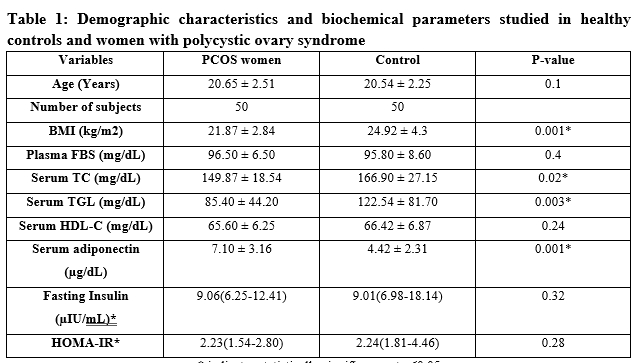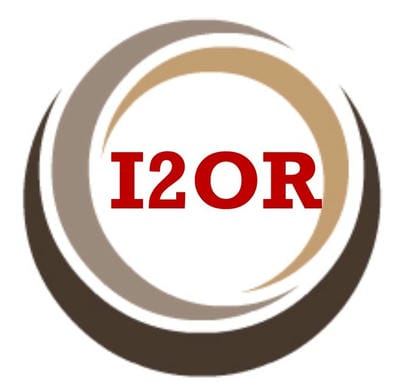Assessment of serum adiponectin levels in women with polycystic ovary syndrome
Abstract
Background and Aim: Serum adiponectin levels were found to be altered in women with polycystic ovary syndrome (PCOS) due to the increased adiposity commonly observed in them. Accordingly, earlier studies have reported decreased adiponectin levels in PCOS women. the present study was conducted to measure serum adiponectin levels in women with PCOS and to evaluate its association with the biochemical parameters studied.
Material and Methods: The present study included 50 women of reproductive age attending the department of Gynecology, tertiary care institute of India and diagnosed with polycystic ovary syndrome based on Rotterdam criteria. Fifty age-matched healthy women were recruited as controls. t. Adiponectin levels were measured along with measurement of fasting blood glucose, lipid profile using commercial kits and insulin resistance (HOMA-IR) was calculated.
Results: Both the study groups were matched concerning age, however, PCOS women were obese when compared to healthy women (p<0.001). Serum total cholesterol and triglyceride levels were significantly higher (p≤0.05) and serum adiponectin concentration was significantly lower in PCOS women when compared to controls (p≤0.05). HDL cholesterol, fasting insulin and HOMA-IR were similar between cases and controls. Adiponectin did not show significant association with any of the parameters studied (Table 2).
Conclusion: Serum adiponectin levels are significantly lower in women with polycystic ovary syndrome compared to healthy women. The hyperandrogenemia which is one of the characteristic features of PCOS leads to a state of adiposity which can further cause a decrease in adiponectin levels.
Downloads
References
Toulis KA, Goulis DG, Farmakiotis D, Georgopoulos NA, Katsikis I, Tarlatzis BC, et al. Adiponectin levels in women with polycystic ovary syndrome: a systematic review and a meta-analysis. Hum Reprod Update. 2009 May-Jun;15(3):297-307. doi: 10.1093/humupd/dmp006.
Ferriman D, Gallwey Jd. Clinical assessment of body hair growth in women. J Clin Endocrinol Metab. 1961 Nov;21:1440-7. doi: 10.1210/jcem-21-11-1440.
Shroff R, Syrop CH, Davis W, Van Voorhis BJ, Dokras A. Risk of metabolic complications in the new PCOS phenotypes based on the Rotterdam criteria. Fertil Steril. 2007 Nov;88(5):1389-95. doi: 10.1016/j.fertnstert.2007.01.032.
Cho LW, Randeva HS, Atkin SL. Cardiometabolic aspects of polycystic ovarian syndrome. Vasc Health Risk Manag. 2007;3(1):55-63.
Handelsman Y. Metabolic syndrome pathophysiology and clinical presentation. Toxicol Pathol. 2009 Jan;37(1):18-20. doi: 10.1177/0192623308329288.
Vuguin PM. Interventional studies for polycystic ovarian syndrome in children and adolescents. Ped Health. 2010 Feb;4(1):59-73. doi: 10.2217/phe.09.69.
Katulski K, Meczekalski B. Historia naturalna zespołu policystycznych jajników [Natural history of polycyclic ovary syndrome]. Pol Merkur Lekarski. 2010 Jul;29(169):58-60. Polish.
Trayhurn P, Beattie JH. Physiological role of adipose tissue: white adipose tissue as an endocrine and secretory organ. Proc Nutr Soc. 2001 Aug;60(3):329-39. doi: 10.1079/pns200194.
Maeda K, Okubo K, Shimomura I, Mizuno K, Matsuzawa Y, Matsubara K. Analysis of an expression profile of genes in the human adipose tissue. Gene. 1997 May 6;190(2):227-35. doi: 10.1016/s0378-1119(96)00730-5.
Koutnikova H, Auwerx J. Regulation of adipocyte differentiation. Ann Med. 2001 Nov;33(8):556-61. doi: 10.3109/07853890108995966.
McTernan PG, McTernan CL, Chetty R, Jenner K, Fisher FM, Lauer MN, et al. Increased resistin gene and protein expression in human abdominal adipose tissue. J Clin Endocrinol Metab. 2002 May;87(5):2407. doi: 10.1210/jcem.87.5.8627.
Haque WA, Shimomura I, Matsuzawa Y, Garg A. Serum adiponectin and leptin levels in patients with lipodystrophies. J Clin Endocrinol Metab. 2002 May;87(5):2395. doi: 10.1210/jcem.87.5.8624.
Matsuzawa Y, Funahashi T, Nakamura T. Molecular mechanism of metabolic syndrome X: contribution of adipocytokines adipocyte-derived bioactive substances. Ann N Y Acad Sci. 1999 Nov 18;892:146-54. doi: 10.1111/j.1749-6632.1999.tb07793.x.
Saito K, Tobe T, Minoshima S, Asakawa S, Sumiya J, Yoda M, Nakano Y, Shimizu N, Tomita M. Organization of the gene for gelatin-binding protein (GBP28). Gene. 1999 Mar 18;229(1-2):67-73. doi: 10.1016/s0378-1119(99)00041-4.
Halleux CM, Takahashi M, Delporte ML, Detry R, Funahashi T, Matsuzawa Y, Brichard SM. Secretion of adiponectin and regulation of apM1 gene expression in human visceral adipose tissue. Biochem Biophys Res Commun. 2001 Nov 16;288(5):1102-7. doi: 10.1006/bbrc.2001.5904.
Takahashi M, Arita Y, Yamagata K, Matsukawa Y, Okutomi K, Horie M, et al. Genomic structure and mutations in adipose-specific gene, adiponectin. Int J Obes Relat Metab Disord. 2000 Jul;24(7):861-8. doi: 10.1038/sj.ijo.0801244.
Maeda N, Takahashi M, Funahashi T, Kihara S, Nishizawa H, Kishida K, et al. PPARgamma ligands increase expression and plasma concentrations of adiponectin, an adipose-derived protein. Diabetes. 2001 Sep;50(9):2094-9. doi: 10.2337/diabetes.50.9.2094.
Yang WS, Jeng CY, Wu TJ, Tanaka S, Funahashi T, Matsuzawa Y, Wang JP, Chen CL, Tai TY, Chuang LM. Synthetic peroxisome proliferator-activated receptor-gamma agonist, rosiglitazone, increases plasma levels of adiponectin in type 2 diabetic patients. Diabetes Care. 2002 Feb;25(2):376-80. doi: 10.2337/diacare.25.2.376.
Ouchi N, Kihara S, Arita Y, Maeda K, Kuriyama H, Okamoto Y, Hotta K, Nishida M, Takahashi M, Nakamura T, Yamashita S, Funahashi T, Matsuzawa Y. Novel modulator for endothelial adhesion molecules: adipocyte-derived plasma protein adiponectin. Circulation. 1999 Dec 21-28;100(25):2473-6. doi: 10.1161/01.cir.100.25.2473.
Matsubara M, Maruoka S, Katayose S. Decreased plasma adiponectin concentrations in women with dyslipidemia. J Clin Endocrinol Metab. 2002 Jun;87(6):2764-9. doi: 10.1210/jcem.87.6.8550.
Arita Y, Kihara S, Ouchi N, Maeda K, Kuriyama H, Okamoto Y, et al. Adipocyte-derived plasma protein adiponectin acts as a platelet-derived growth factor-BB-binding protein and regulates growth factor-induced common postreceptor signal in vascular smooth muscle cell. Circulation. 2002 Jun 18;105(24):2893-8. doi: 10.1161/01.cir.0000018622.84402.ff.
Yang WS, Lee WJ, Funahashi T, Tanaka S, Matsuzawa Y, Chao CL, et al. Weight reduction increases plasma levels of an adipose-derived anti-inflammatory protein, adiponectin. J Clin Endocrinol Metab. 2001 Aug;86(8):3815-9. doi: 10.1210/jcem.86.8.7741. Erratum in: J Clin Endocrinol Metab 2002 Apr;87(4):1626.
Berg AH, Combs TP, Du X, Brownlee M, Scherer PE. The adipocyte-secreted protein Acrp30 enhances hepatic insulin action. Nat Med. 2001 Aug;7(8):947-53. doi: 10.1038/90992.
Kondo H, Shimomura I, Matsukawa Y, Kumada M, Takahashi M, Matsuda M, et al. Association of adiponectin mutation with type 2 diabetes: a candidate gene for the insulin resistance syndrome. Diabetes. 2002 Jul;51(7):2325-8. doi: 10.2337/diabetes.51.7.2325.
Tsao TS, Lodish HF, Fruebis J. ACRP30, a new hormone controlling fat and glucose metabolism. Eur J Pharmacol. 2002 Apr 12;440(2-3):213-21. doi: 10.1016/s0014-2999(02)01430-9.
Ouchi N, Kihara S, Arita Y, Okamoto Y, Maeda K, Kuriyama H, et al. Adiponectin, an adipocyte-derived plasma protein, inhibits endothelial NF-kappaB signaling through a cAMP-dependent pathway. Circulation. 2000 Sep 12;102(11):1296-301. doi: 10.1161/01.cir.102.11.1296.
Stefan N, Bunt JC, Salbe AD, Funahashi T, Matsuzawa Y, Tataranni PA. Plasma adiponectin concentrations in children: relationships with obesity and insulinemia. J Clin Endocrinol Metab. 2002 Oct;87(10):4652-6. doi: 10.1210/jc.2002-020694.
Yilmaz M, Bukan N, Demirci H, Oztürk C, Kan E, Ayvaz G, Arslan M. Serum resistin and adiponectin levels in women with polycystic ovary syndrome. Gynecol Endocrinol. 2009 Apr;25(4):246-52. doi: 10.1080/09513590802653833.
Mannerås-Holm L, Leonhardt H, Kullberg J, Jennische E, Odén A, Holm G, et al, Adipose tissue has aberrant morphology and function in PCOS: enlarged adipocytes and low serum adiponectin, but not circulating sex steroids, are strongly associated with insulin resistance. J Clin Endocrinol Metab. 2011 Feb;96(2):E304-11. doi: 10.1210/jc.2010-1290.
Ardawi MS, Rouzi AA. Plasma adiponectin and insulin resistance in women with polycystic ovary syndrome. Fertil Steril. 2005 Jun;83(6):1708-16. doi: 10.1016/j.fertnstert.2004.11.077.
Barber TM, Hazell M, Christodoulides C, Golding SJ, Alvey C, Burling K, et al. Serum levels of retinol-binding protein 4 and adiponectin in women with polycystic ovary syndrome: associations with visceral fat but no evidence for fat mass-independent effects on pathogenesis in this condition. J Clin Endocrinol Metab. 2008 Jul;93(7):2859-65. doi: 10.1210/jc.2007-2759.
Carmina E, Orio F, Palomba S, Cascella T, Longo RA, Colao AM, Lombardi G, Lobo RA. Evidence for altered adipocyte function in polycystic ovary syndrome. Eur J Endocrinol. 2005 Mar;152(3):389-94. doi: 10.1530/eje.1.01868.
Escobar-Morreale HF, Villuendas G, Botella-Carretero JI, Alvarez-Blasco F, Sanchón R, Luque-Ramírez M, et al. Adiponectin and resistin in PCOS: a clinical, biochemical and molecular genetic study. Hum Reprod. 2006 Sep;21(9):2257-65. doi: 10.1093/humrep/del146.
Sepilian V, Nagamani M. Adiponectin levels in women with polycystic ovary syndrome and severe insulin resistance. J Soc Gynecol Investig. 2005 Feb;12(2):129-34. doi: 10.1016/j.jsgi.2004.09.003.
Wickham EP 3rd, Cheang KI, Clore JN, Baillargeon JP, Nestler JE. Total and high-molecular weight adiponectin in women with the polycystic ovary syndrome. Metabolism. 2011 Mar;60(3):366-72. doi: 10.1016/j.metabol.2010.02.019.
Escobar-Morreale HF, Villuendas G, Botella-Carretero JI, Alvarez-Blasco F, Sanchón R, Luque-Ramírez M, et al. Adiponectin and resistin in PCOS: a clinical, biochemical and molecular genetic study. Hum Reprod. 2006 Sep;21(9):2257-65. doi: 10.1093/humrep/del146.
Li H, Chen Y, Li Y, Huang J, Zhao X, Chen X, Yang D. [A case-control study of correlation between serum adiponectin levels and polycystic ovary syndrome]. Zhonghua Fu Chan Ke Za Zhi. 2015 Nov;50(11):814-8. Chinese.
O'Connor A, Phelan N, Tun TK, Boran G, Gibney J, Roche HM. High-molecular-weight adiponectin is selectively reduced in women with polycystic ovary syndrome independent of body mass index and severity of insulin resistance. J Clin Endocrinol Metab. 2010 Mar;95(3):1378-85. doi: 10.1210/jc.2009-1557.
Toulis KA, Goulis DG, Farmakiotis D, Georgopoulos NA, Katsikis I, Tarlatzis BC, Papadimas I, Panidis D. Adiponectin levels in women with polycystic ovary syndrome: a systematic review and a meta-analysis. Hum Reprod Update. 2009 May-Jun;15(3):297-307. doi: 10.1093/humupd/dmp006.
Shoaib, O. M., Mustafa, S. M., & Nourein, I. H. (2015). Serum lipid profile of polycystic ovary syndrome in Sudanese women. International Journal of Medical Science and Public Health, 4(11), 1605-1610.
Wild RA. Dyslipidemia in PCOS. Steroids. 2012 Mar 10;77(4):295-9. doi: 10.1016/j.steroids.2011.12.002.
Weyer C, Funahashi T, Tanaka S, Hotta K, Matsuzawa Y, Pratley RE, Tataranni PA. Hypoadiponectinemia in obesity and type 2 diabetes: close association with insulin resistance and hyperinsulinemia. J Clin Endocrinol Metab. 2001 May;86(5):1930-5. doi: 10.1210/jcem.86.5.7463.
Tschritter O, Fritsche A, Thamer C, Haap M, Shirkavand F, Rahe S, et al. Plasma adiponectin concentrations predict insulin sensitivity of both glucose and lipid metabolism. Diabetes. 2003 Feb;52(2):239-43. doi: 10.2337/diabetes.52.2.239.
Ramanand SJ, Ghongane BB, Ramanand JB, Patwardhan MH, Ghanghas RR, Jain SS. Clinical characteristics of polycystic ovary syndrome in Indian women. Indian J Endocrinol Metab. 2013 Jan;17(1):138-45. doi: 10.4103/2230-8210.107858.

Copyright (c) 2021 Author (s). Published by Siddharth Health Research and Social Welfare Society

This work is licensed under a Creative Commons Attribution 4.0 International License.


 OAI - Open Archives Initiative
OAI - Open Archives Initiative



















 Therapoid
Therapoid

